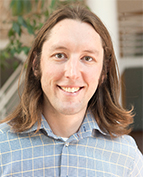
ACS Synthetic Biology is pleased to announce that Dr. Julius B. Lucks, Assistant Professor in the Robert F. Smith School of Chemical and Biomolecular Engineering at Cornell University, is the recipient of the 2016 ACS Synthetic Biology Young Investigator Award. This award was established in 2014 and recognizes the contributions of a scientist who has made a major impact on the field of synthetic biology, early on in their career.
This year’s award will be presented at the Synthetic Biology: Engineering, Evolution & Design (SEED) conference, July 18-21, 2016, in Chicago, IL. Dr. Lucks will be presenting his work on Wednesday, July 20, 2016.

Dr. Julius B. Lucks
“It is an incredible honor to be recognized with the ACS Synthetic Biology Young Investigator Award. The field of synthetic biology is at an extremely exciting moment in its history, as can be seen clearly through all of the great work being published in ACS Synthetic Biology. For my group and I to be recognized with this prestigious award by the American Chemical Society is an inspiration. It has made us even more excited to unlock the potential of RNA, and to keep building the synthetic biology community.”
Julius B. Lucks is an Assistant Professor in the Robert F. Smith School of Chemical and Biomolecular Engineering at Cornell University. As a Hertz Fellow at Harvard University, he worked on problems in theoretical biophysics including RNA folding and translocation, viral capsid structure, and viral genome organization, under the guidance of David R. Nelson. As a Miller Fellow at UC Berkeley in the laboratory of Adam P. Arkin, he helped create some of the first RNA transcriptional networks that function inside cells. With Arkin, Jennifer Doudna and Lior Pachter, he lead the team that developed SHAPE-Seq, a technology that uses next generation sequencing to characterize RNA structures in unprecedented throughput. This breakthrough is now being used to uncover the role of RNA structure in regulating fundamental cellular processes across the genome. For these and other pioneering research efforts, he has been named a DARPA Young Faculty Awardee, an Alfred P. Sloan Foundation Research Fellow, an ONR Young Investigator, an NIH New Innovator, and an NSF CAREER awardee.
The Lucks group focuses on dynamically programming cellular behavior with synthetic RNA circuitry. They create new classes of programmable RNA regulators with protein-like dynamic ranges, and use SHAPE-Seq to understand RNA folding dynamics in the cell. For more information on the Lucks Lab see LucksLab.org
